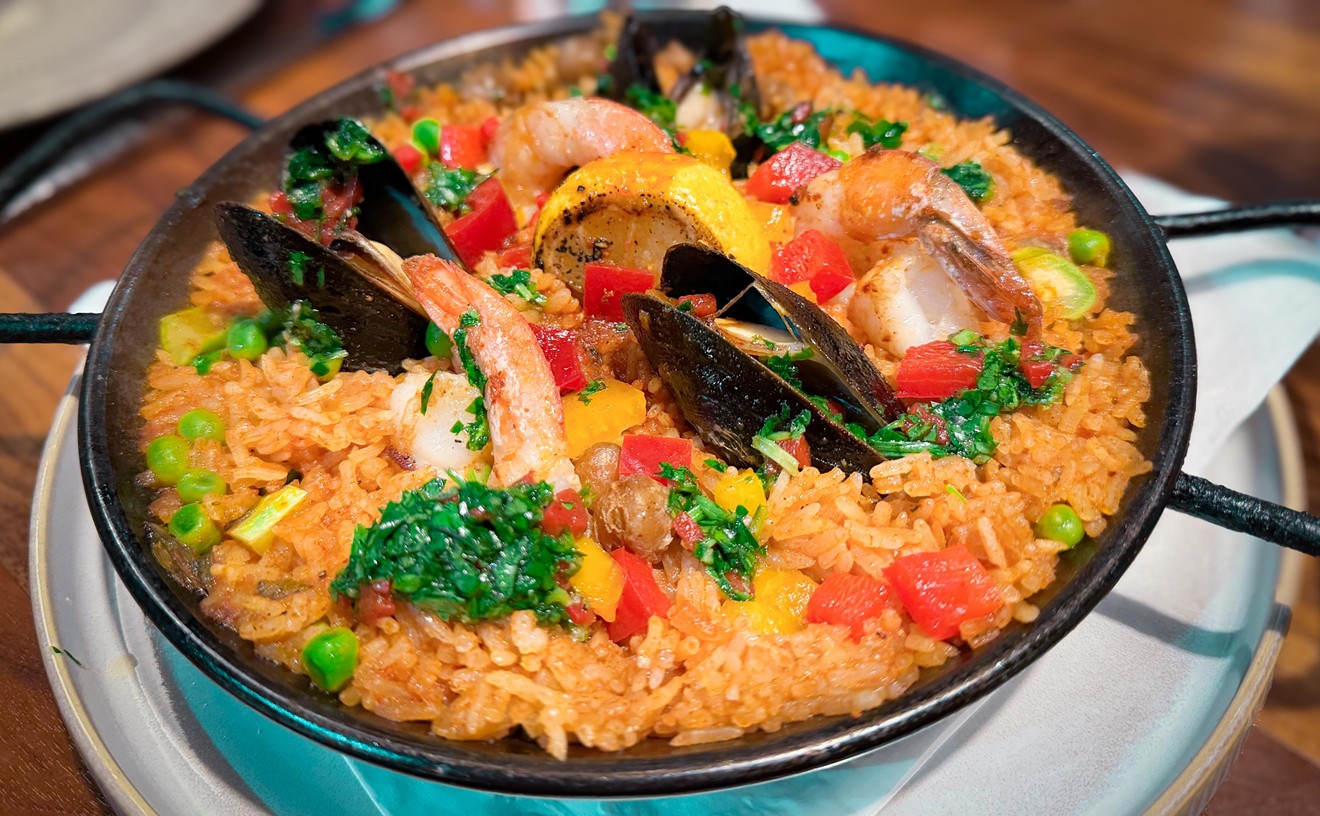You might think the restaurant world wastes a lot of food, especially after watching guys like Gordon Ramsay turn full skillets of barely imperfect food directly into the trash. Sure, plenty of food is discarded because it's burned, seasoned improperly or just doesn’t meet the exacting standards of a demanding executive chef. But the misshapen ends of perfectly diced vegetables, fat trimmed away from steaks and chicken, and other things normally destined for the garbage can in your own kitchen frequently find their ways into the stockpots and roasting pans of professional chefs. In many cases, things we typically throw away add a significant amount of flavor, and that’s something any chef with a tight food budget is smart to pay attention to.
Beyond stocks and sauces, Dallas chefs are putting their scraps and odds and ends to much more interesting uses. We asked some of Dallas' culinary stars how they’re turning what you might think of as trash into edible treasure.
Jon Thompson, Sugarbacon
In the process of making Sugarbacon’s signature dish (hint: It’s called Sugarbacon), chef Jon Thompson gets a delicious and unique byproduct: smoky and succulent pork lard and a “confit gel,” or rich pork stock. “That usually would never amount to much, but because we make so much pork belly, we have it in spades,” Thompson says. “We use it instead of chicken stock or a ham-hock broth, which adds all that flavor. Then, we use the lard as cooking fat instead of oil or butter — it produces a great sear and, yes, a little smokiness.”
Taylor Kearney, Front Room Tavern
Even though he’s situated in one of Dallas’ fanciest hotels, Front Room Tavern’s chef Taylor Kearney is a serious “waste not, want not” overachiever. Scraps are used in a number of ways in Kearney’s kitchen, and pretty much anything that can add flavor or texture finds its way into a stockpot or roasting pan. After Kearney ages the duck on his menu, he removes the excess skin to render duck fat and serves the crisped skin as a truffle-Parmesan duck chicharrón.
Milk solids, typically discarded after making clarified butter, make an appearance as a melt-in-your-mouth brown butter powder. When trimming rib-eyes, Kearney’s cooks remove the top layer of fat, render it, and use it in a pie dough for foie gras and beef pies. Even the pulpy, seedy hearts of tomatoes aren’t left out. “The seeds of a tomato contain a ton of natural gelatin,” says Kearney. “So any time we make a vegetable terrine, we use the tomato hearts to make an aspic to give the gel a red tint.”
Oliver Sitrin, The Blind Butcher
If you’ve ever been to the sausage heaven that is The Blind Butcher, you're probably not surprised that chef Oliver Sitrin has a firm zero-waste policy. “All of our bones are made into stocks, sauces or broth, and the excess meat and fat go into the sausages,” says Sitrin. “Vegetable peels and egg shells are composted or given away to feed friends’ pigs or birds. And we recycle.”
Mark Wootton, Garden Cafe
The “garden” in Garden Cafe isn’t just a name — growing things fill a lot behind this small East Dallas restaurant, which means chef Mark Wootton needs all the kitchen scraps he can get his hands on. In addition to feeding Garden Cafe’s small flock of chickens, Wootton has thousands of hungry critters waiting in the grass for his constant supply of organic produce. “We use some of the scraps for the worm ranch,” Wootton says. “Everything else is turned into compost for the garden.”
Tom Dynan, Unleavened
Unleavened may be one of the best places in town to grab a fresh and healthy meal, but like any other restaurant, it uses plenty of cooking oil. Instead of sending that oil away to a landfill, Dynan works with an oil collection company that converts used cooking oil into biodiesel. Once gardening season kicks off, Dynan is looking forward to giving an interesting (and useful) gift to the growers in the community. “In the early spring, we’re looking forward to offering our used coffee grounds to local gardeners to take home for their outdoor projects,” Dynan says. If you need to balance the pH of your soil (which is what coffee does) you can line up at the doors of Unleavened for something a bit different than your usual fried chicken salad.
Matt Dallman, 18th & Vine BBQ
Not much is wasted at a barbecue restaurant. We pay good money to eat the crispy-charred burnt ends that are trimmed from brisket. At 18th & Vine, chef Matt Dallman keeps his staff in delicious smoked meats and side dishes as a way to avoid wasting food. “Anything extra that we have goes directly into family meals,” Dallman says. If you were looking for a reason to change careers and get into the restaurant business, constant access to burnt ends and fried okra is as good a reason as any.
[
{
"name": "Air - MediumRectangle - Inline Content - Mobile Display Size",
"component": "18855504",
"insertPoint": "2",
"requiredCountToDisplay": "2"
},{
"name": "Editor Picks",
"component": "17105533",
"insertPoint": "4",
"requiredCountToDisplay": "1"
},{
"name": "Inline Links",
"component": "18349797",
"insertPoint": "8th",
"startingPoint": 8,
"requiredCountToDisplay": "7",
"maxInsertions": 25
},{
"name": "Air - MediumRectangle - Combo - Inline Content",
"component": "17105532",
"insertPoint": "8th",
"startingPoint": 8,
"requiredCountToDisplay": "7",
"maxInsertions": 25
},{
"name": "Inline Links",
"component": "18349797",
"insertPoint": "8th",
"startingPoint": 12,
"requiredCountToDisplay": "11",
"maxInsertions": 25
},{
"name": "Air - Leaderboard Tower - Combo - Inline Content",
"component": "17105535",
"insertPoint": "8th",
"startingPoint": 12,
"requiredCountToDisplay": "11",
"maxInsertions": 25
}
]










